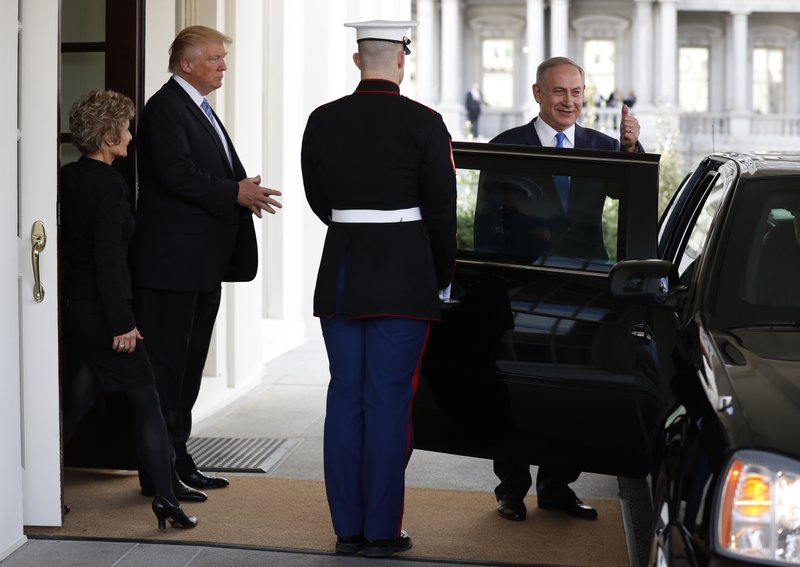JERUSALEM -- The United Nations and the Arab League on Thursday issued a joint statement in support of the establishment of a Palestinian state, a day after President Donald Trump said it's up to Israel and the Palestinians to agree on the form of a final settlement.
RELATED ARTICLES
http://www.arkansas…">Trump condemns leaks http://www.arkansas…">New U.S. travel ban on the way http://www.arkansas…">Eateries, schools shut as immigrants protesthttp://www.arkansas…">Health care overhaul outlined http://www.arkansas…">Israel-envoy pick apologizes for insults, vows to changehttp://www.arkansas…">White House budget chief sworn in http://www.arkansas…">U.S. signals no shift on Russia http://www.arkansas…">With FHA rate cut off, Trump's policy for housing blurry http://www.arkansas…">Northwest Arkansas students miss school, business close for A Day Without Immigrants
The statement came a day after Trump and Israeli Prime Minister Benjamin Netanyahu, who was visiting the U.S., refused to endorse the two-state solution as the preferred outcome of peace talks, abandoning what has been the cornerstone of U.S.-led peace efforts for two decades.
After a meeting in Cairo, U.N. Secretary-General Antonio Guterres and Arab League Chief Ahmed Aboul-Gheit said they agreed that the two-state solution is "the only way to achieve comprehensive and just settlement to the Palestinian cause."
The statement put them at odds with Trump, who said at a White House meeting with Netanyahu that Mideast peace does not necessarily have to include the establishment of a Palestinian state. Trump said he could accept a two-state solution or a single-state arrangement if it is agreed upon by all sides. Netanyahu also was cool to the idea of an independent Palestinian state, saying he did not want to deal with "labels."
[PRESIDENT TRUMP: Timeline, appointments, executive orders + guide to actions in first 100 days]
The Trump administration appeared to backpedal Thursday, with U.S. Ambassador Nikki Haley saying the United States absolutely supports a two-state solution to the Israeli-Palestinian conflict and that anyone who thinks it doesn't is in "error."
"We are thinking out of the box as well, which is: What does it take to bring these two sides to the table? What do we need to have them agree on?" she said.
Haley also said the solution to the conflict has to come from the Israelis and Palestinians, but she said several times and stressed: "We absolutely support a two-state solution."
Haley, when asked whether the United States would carry out its obligations under the U.N. Security Council resolution that called for the establishment of two states, said, "Understand that the United States supports the two-state resolution. That's never been wavered."
"What we're saying is, OK, let's not just talk about the old way of doing things," she said. "Come to the table with all the fresh atmosphere and perspectives that we now have, and think, OK, what can we do knowing all of the factors, knowing where we sit present-day, and how can we move forward."
Guterres had stressed earlier Wednesday that there is no "Plan B" to a two-state solution. Haley was asked if the United States had a "Plan B."
"I think, first of all, a two-state solution is what we support," she said. "Anybody who wants to say the United States doesn't support a two-state solution -- that would be an error."
Trump also urged Netanyahu during their joint news conference at the White House on Wednesday to "hold off" on Jewish settlement construction in territory the Palestinians claim for their future state, to try to facilitate talks.
"What the president has said and we agree on is that expanding settlements at this point is not helpful," Haley said. "That's basically what we're saying to both sides. Let's take a pause."
She said that what Trump and the new administration are going to try to do is facilitate "some constructive action."
"We're just unbiased," Haley said. "Bring them to the table and say, 'OK, we're going to do this.'"
The U.S. ambassador spoke to reporters after attending the Security Council's monthly meeting on the Middle East -- her first.
The Palestinians and the international community have long favored the establishment of an independent Palestinian state as the preferred way to peace in the region. Last month, days before Trump took office, representatives from dozens of countries reiterated the need for a two-state solution.
In New York, the U.N.'s Mideast envoy, Nickolay Mladenov, urged "leaders on both sides to carefully contemplate the future they envision for their people." He said they would need to choose between "perpetual conflict" or "mutual respect."
Netanyahu's governing coalition is dominated by hard-liners opposed to Palestinian statehood, citing the West Bank's value as a security asset and its connection to Jewish history.
Information for this article was contributed by Edith M. Lederer and Maggie Michael of The Associated Press.
A Section on 02/17/2017
